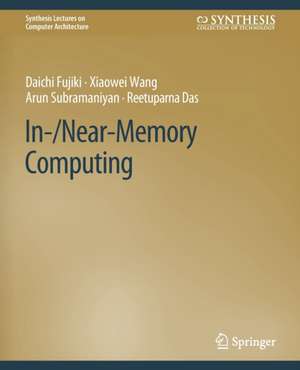In-/Near-Memory Computing: Synthesis Lectures on Computer Architecture
Autor Daichi Fujiki, Xiaowei Wang, Arun Subramaniyan, Reetuparna Dasen Limba Engleză Paperback – 12 aug 2021
Din seria Synthesis Lectures on Computer Architecture
-
 Preț: 359.05 lei
Preț: 359.05 lei - 18%
 Preț: 690.24 lei
Preț: 690.24 lei - 20%
 Preț: 281.76 lei
Preț: 281.76 lei -
 Preț: 453.85 lei
Preț: 453.85 lei -
 Preț: 226.98 lei
Preț: 226.98 lei -
 Preț: 388.52 lei
Preț: 388.52 lei -
 Preț: 353.79 lei
Preț: 353.79 lei -
 Preț: 261.32 lei
Preț: 261.32 lei -
 Preț: 413.27 lei
Preț: 413.27 lei -
 Preț: 494.18 lei
Preț: 494.18 lei -
 Preț: 260.56 lei
Preț: 260.56 lei -
 Preț: 194.92 lei
Preț: 194.92 lei -
 Preț: 450.11 lei
Preț: 450.11 lei -
 Preț: 319.21 lei
Preț: 319.21 lei -
 Preț: 449.53 lei
Preț: 449.53 lei -
 Preț: 264.41 lei
Preț: 264.41 lei -
 Preț: 418.07 lei
Preț: 418.07 lei -
 Preț: 386.22 lei
Preț: 386.22 lei -
 Preț: 486.98 lei
Preț: 486.98 lei -
 Preț: 264.20 lei
Preț: 264.20 lei -
 Preț: 383.71 lei
Preț: 383.71 lei -
 Preț: 346.86 lei
Preț: 346.86 lei -
 Preț: 265.18 lei
Preț: 265.18 lei -
 Preț: 323.45 lei
Preț: 323.45 lei -
 Preț: 260.18 lei
Preț: 260.18 lei -
 Preț: 191.48 lei
Preț: 191.48 lei -
 Preț: 206.29 lei
Preț: 206.29 lei -
 Preț: 205.92 lei
Preț: 205.92 lei -
 Preț: 205.70 lei
Preț: 205.70 lei -
 Preț: 207.06 lei
Preț: 207.06 lei -
 Preț: 260.95 lei
Preț: 260.95 lei -
 Preț: 261.91 lei
Preț: 261.91 lei -
 Preț: 192.63 lei
Preț: 192.63 lei -
 Preț: 262.09 lei
Preț: 262.09 lei -
 Preț: 259.41 lei
Preț: 259.41 lei -
 Preț: 260.95 lei
Preț: 260.95 lei -
 Preț: 456.66 lei
Preț: 456.66 lei -
 Preț: 261.53 lei
Preț: 261.53 lei -
 Preț: 486.42 lei
Preț: 486.42 lei -
 Preț: 210.55 lei
Preț: 210.55 lei -
 Preț: 387.58 lei
Preț: 387.58 lei -
 Preț: 448.38 lei
Preț: 448.38 lei -
 Preț: 264.20 lei
Preț: 264.20 lei -
 Preț: 262.68 lei
Preț: 262.68 lei -
 Preț: 263.06 lei
Preț: 263.06 lei - 20%
 Preț: 288.91 lei
Preț: 288.91 lei -
 Preț: 260.95 lei
Preț: 260.95 lei -
 Preț: 313.82 lei
Preț: 313.82 lei
Preț: 481.05 lei
Nou
Puncte Express: 722
Preț estimativ în valută:
92.06€ • 95.76$ • 76.00£
92.06€ • 95.76$ • 76.00£
Carte tipărită la comandă
Livrare economică 15-29 aprilie
Preluare comenzi: 021 569.72.76
Specificații
ISBN-13: 9783031006449
ISBN-10: 3031006445
Pagini: 124
Ilustrații: XV, 124 p.
Dimensiuni: 191 x 235 x 12 mm
Greutate: 0.26 kg
Editura: Springer International Publishing
Colecția Springer
Seria Synthesis Lectures on Computer Architecture
Locul publicării:Cham, Switzerland
ISBN-10: 3031006445
Pagini: 124
Ilustrații: XV, 124 p.
Dimensiuni: 191 x 235 x 12 mm
Greutate: 0.26 kg
Editura: Springer International Publishing
Colecția Springer
Seria Synthesis Lectures on Computer Architecture
Locul publicării:Cham, Switzerland
Cuprins
Preface.- Acknowledgments.- Introduction.- Technology Basics and Taxonomy.- Computing with DRAMs.- Computing with SRAMs.- Computing with Non-Volatile Memories.- Domain-Specific Accelerators.- Programming Models.- Closing Thoughts.- Bibliography.- Authors' Biographies.
Notă biografică
Daichi Fujiki received his B.E. degree from Keio University, Tokyo, Japan, in 2016 and his M.S.Eng. degree from the University of Michigan, Ann Arbor, MI, in 2017. He is currently pursuing a Ph.D. in Computer Science and Engineering with the University of Michigan, Ann Arbor, MI. He is a member of the Mbits Research Group, Computer Engineering Laboratory (CELAB), University of Michigan, which develops in-situ compute memory architectures and custom acceleration hardware for bioinformatics workloads.
Xiaowei Wang received his B.Eng. degree in Electronic Information Science and Technology from Tsinghua University, Beijing, China, in 2015. He received his M.S. degree in Computer Science and Engineering from the University of Michigan, Ann Arbor, MI, in 2017, where he is currently pursuing a Ph.D. in Computer Science and Engineering. He is advised by Prof. Reetuparna Das. His research interests include domain-specific architectures for machine learning, in-memory computing, and hardware/software co-design.
Arun Subramaniyan received his B.E (Hons.) in Electrical and Electronics from the Birla Institute of Technology and Science (BITS-Pilani), India in 2015. He is currently a Ph.D. student at the University of Michigan, advised by Prof. Reetuparna Das. His dissertation research focuses on developing efficient algorithms and customized computing systems for precision health. He is also interested in in-memory computing architectures and hardware reliability. His work has been recognized by UM’s Precision Health Scholars Award, a Rackham International Students Fellowship, an IEEE Micro Top Picks Award, and a Best Paper Award in CODESCISSS.
Reetuparna Das received her Ph.D. in Computer Science and Engineering from the Pennsylvania State University, University Park, PA, in 2010. She was a Research Scientist with the Intel Labs, Santa Clara, CA, and the Researcher-In-Residence with the Center for Future Architectures Research, Ann Arbor, MI. She is currently an Associate Professor with the University of Michigan, Ann Arbor. Some of her recent projects include in-memory architectures, custom computing for precision health and AI, fine-grain heterogeneous core architectures for mobile systems, and low-power scalable interconnects for kilo-core processors. She has authored over 45 articles and holds 7 patents. Prof. Das received two IEEE top picks awards, the NSF CAREER Award, the CRA-W’s Borg Early Career Award, the Intel Outstanding Researcher Award, and the Sloan Foundation Fellowship. She has been inducted into IEEE/ACM MI CRO and ISCA Hall of Fame. She served on over 30 technical program committees and as the Program Co-Chair for MICRO-52.